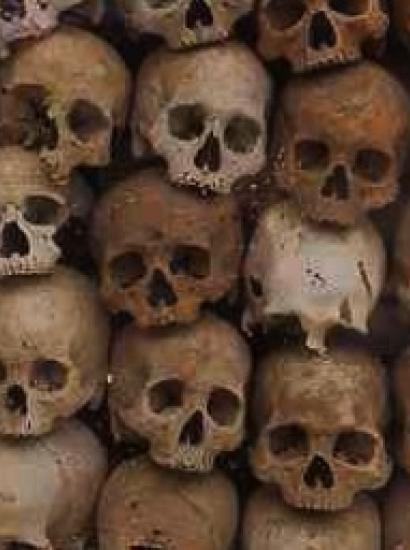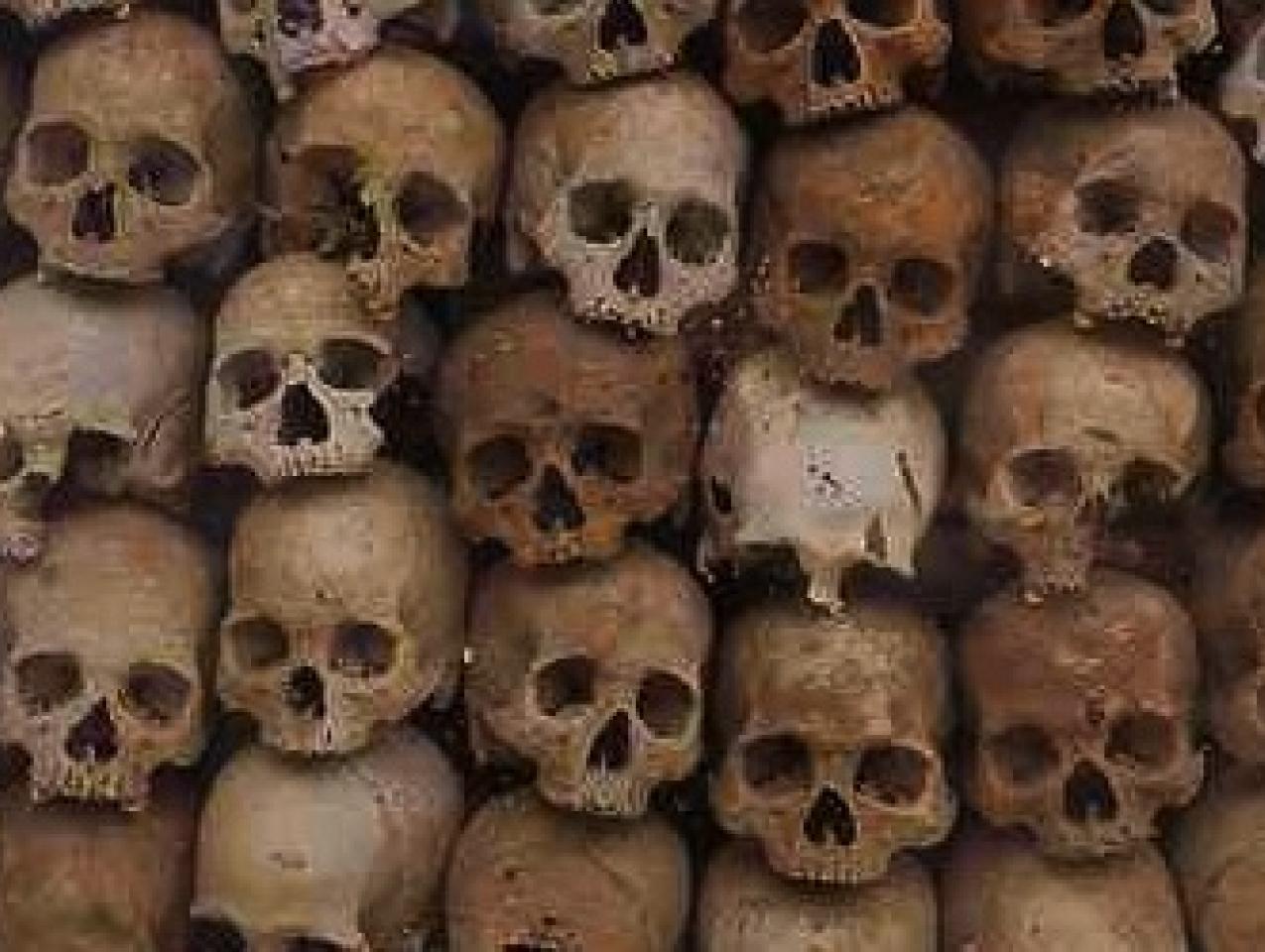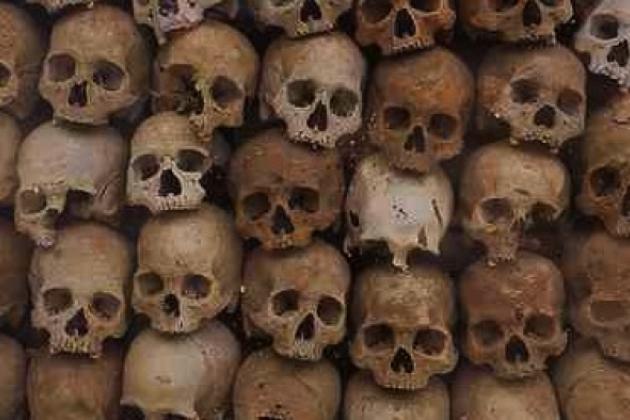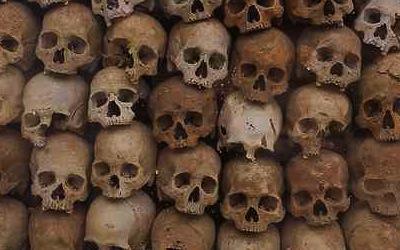- History
- Politics, Institutions, and Public Opinion
Great evil never rises to the occasion. We have expectations of it that are never met. The philosopher Hannah Arendt gave us that singular lesson in her extraordinary Eichmann in Jerusalem, first published in 1963. The crimes had been monumental, but the man she glimpsed in a glass booth was a disappointment: “medium-sized, slender, middle-aged, with receding hair, ill-fitting teeth, and nearsighted eyes, who throughout the trial keeps craning his scraggy neck toward the bench.” The very ordinary—“banal”—man, and the extraordinary crimes.
A March 15 dispatch from Phnom Pen underscored the timeless power of Arendt’s insight. Ieng Sary, the “foreign minister” of the Khmer Rouge, died in a local hospital on March 14, at age 87. He had been hospitalized for “digestion problems,” no verdict had been issued against him by a United Nations-backed tribunal investigating the crimes of that genocidal lot.
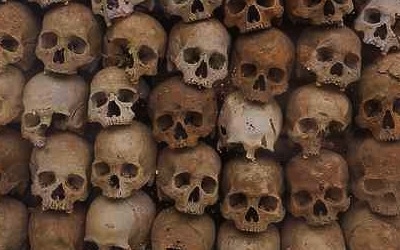
The victims of Pol Pot (Photo credit: totalitarism)
Ieng Sary had an exalted Khmer Rouge pedigree; he was a brother-in-law of Pol Pot, yet he was to succumb to a natural death. His wife, Ieng Thirith, a government minister, did him one better: the charges against her were dropped last September; she was ruled unfit to stand trial on grounds of dementia. No violence against the victims could be greater: the perpetrators of terror being spared even the pain of memory.
An estimated 1.7 million Cambodians perished in the time of those killing fields. The Khmer Rouge all but extirpated urban life as a nation was dispatched to the countryside to scramble for survival. In the face of that great sorrow, the tribunal has managed to secure one conviction, and two principal remaining defendants. The head of state under the regime, and its chief ideologue, are likely to succumb to natural death before the tribunal pronounces on their crimes.
Pol Pot, Brother Number One, who had conceived that agrarian utopia after years in Paris, died in 1998. The trial of Brother Number Two, the chief ideologue Nuon Chea, was off and on, due to his fatigue and high blood pressure. Only Comrade Duch, the warden of the prison system, was found guilty of war crimes in a judgment reached in July of 2010. Duch had overseen an extensive penal system. He was alone in granting his victims a measure of contrition: “I am accountable to the entire Cambodian population for the souls that perished…I ended up serving a criminal organization. I could not withdraw from it. I was like a cog in a machine.”
Duch, a former school teacher, was sentenced to 19 years in prison for his crimes. When justice caught up with him, he had been living quietly in the countryside for two decades, having converted to Christianity.
It’s always like this with perpetrators of big crimes, always disappointing. Radovan Karadzic, who presided over the self-styled “Serbian Republic” in eastern Bosnia, and helped ignite a genocidal campaign against the Bosnian Muslims and Croats, on the run for 13 years, was found in a drab suburb of Belgrade, living under an assumed name, giving lectures on alternative medicine and spirituality; he had become a healer, offering treatments for depression and impotence. The survivors of his merciless siege of Sarajevo would have been hard-pressed to recognize in him the wanton cruelty with which he prosecuted his war against the polyglot city. He had been born in Montenegro, but the worldly Sarajevo had taken him in, given him a successful career, and he had repaid it in the coin of great cruelty.
In the same vein, Ratko Mladic, the author of the massacre of Srebrenica, Europe’s most deadly single episode of violence in the aftermath of World War II, was a shell of his old self when he was picked up in a village in northern Serbia, some sixteen years after the massacre. He was said to be suffering from cancer. Those who saw that knight of Serbian nationalism in July of 1995, separating the estimated 8,000 Muslim men and older boys, and sending them to their deaths, could never find satisfaction. The years had diminished the man.
He had been barrel-chested, overweight, and menacing in that shameful summer of 1995, when he forced the Dutch “peacekeepers” to surrender and sent his victims to their death. A different man was captured, and Serbia, having choked on its legends, no longer needed him and was keen to have the help and the patronage of the European Union.
***
Some years ago, in my travels to Iraq to write about the American war, I was given the chance to attend the trial of “Chemical Ali,” Saddam Hussein’s cousin and henchman, Ali Hassan al-Majid. Chemical Ali had earned his moniker in the hills of Kurdistan. He had led the notorious “Anfal Campaign,” a war of terror and extermination that the Baathist tyranny had unleashed on the Kurds in 1987-88 that had taken 180,000 lives and scorched thousands of villages and hamlets. Traveling among the Kurds a generation after the Anfal, it took no effort to encounter survivors of that genocidal campaign—orphans, widows, and siblings seared by the terror and by the helicopter gunships raining death.
I had gone to Halabja, a town that bore the brunt of the terror, and where a simple museum, a monument to that hellish time, stood sorrowful and forlorn against the mountains. I had seen television footage of Chemical Ali, a preening cruel man, with people cowering in fear before him. Now at court, the military uniform had been shed for a simple white dishdasha and a kafiyya, the traditional head cover. He was ingratiating, and thankful as a guard handed him a bottle of water.
A witness, hidden behind a curtain, was to tell of a particular crime of Chemical Ali that he had seen in Basra. The “brother witness” was cross-examined in the friendliest of manners by the defendant. He was not anywhere in Basra at that time, Ali Hassan al-Majid said; he had been elsewhere carrying on the business of the state.
I related that unsettling episode to an American-educated lawyer who had served as the director of a tribunal investigating the crimes of the Saddam Hussein era. He told me of his own, more poignant encounter with evil. He had never struck me as a particularly religious man, but he let it slip that he had been nervous enough to read verses of the Koran to calm himself down as he prepared to meet Chemical Ali and a handful of the regime’s leaders. Chemical Ali had surprised him with his servility; “Brother Salem,” he called the young prosecutor.
Now and then, retribution comes fast and furious, without the legal niceties, without the judges and lawyers, in The Hague. It has a cruel honesty all its own. This was the fate of the Libyan despot, Muammar Qaddafi, dragged out of a drainage pipe, by young rebels whose lives he had dominated. He had not been heroic when he surrendered to them. He had tried to appeal to them and to supplicate himself, to tell them that it was haram, impermissible in Arab and Muslim norms, to kill him. A gruesome murder followed, with violation of the corpse thrown into the bargain.
Liberal sensibilities squirmed. The man had been killed in captivity but those young men who had shown him no mercy were formed in the large prison that Qaddafi had constructed for the Libyans. He had taunted his subjects with his sexual license, with his vanity; he had stolen the treasure of the land, allocated it onto himself, his wife, and his brood. Those captors had no interest in a long drawn-out trial.
Hannah Arendt’s book does not travel everywhere. But the terrible man who ruled Libya for some four decades bore no resemblance to the rooster who had masqueraded as a fearless warrior of the desert.









